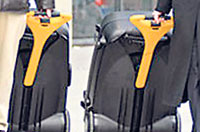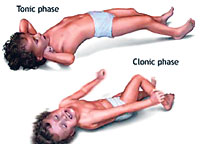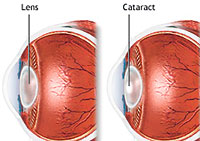Whether you’re travelling or welcoming people into your home, lifting luggage can be hazardous.
The American Academy of Orthopaedic Surgeons offers this advice to help prevent injury while lifting luggage:
- Opt for suitcases that are lightweight but sturdy, and have wheels for easier transportation.
- Pack items in a few smaller bags rather than packing one huge, heavy suitcase.
- Stand next to the suitcase and lift while bending at the knees -- not the waist -- using your leg muscles.
- Hold the suitcase as close to the centre of your body as possible.
- Use both hands, if possible, rather than carrying the suitcase on one side.
- Keep your body straight, rather than twisting or turning.
- Don’t be in a rush, and ask for help when you need it.
Managing febrile seizures
When infants and young children get a fever, they can also have a "febrile" (feverish) seizure. This type of seizure doesn't mean the child has epilepsy or brain damage. It's usually not serious and typically resolves on its own.
The Nemours Foundation offers these suggestions for managing a child's febrile seizure:
- Keep the child in a safe, soft area to protect the head.
- Have the child lie down on his or her side, to prevent choking.
- Make sure the child is breathing well and that the face isn't changing colour. If the child turns blue or another colour, or the seizure lasts longer than 10 minutes, consider it a medical emergency.
- Call your child's doctor for an evaluation after the seizure ends.
During the seizure:
- Don't hold the child down or try to restrain the child.
- Don't put anything inside the child's mouth.
- Don't immerse your child in water in an attempt to bring the fever down.
Signs that you have Cataracts
Cataracts are an eye condition characterized by a cloudiness of the eye's lens. They usually develop slowly as a person gets older.
The U.S. National Library of Medicine offers this list of cataract symptoms:
- Vision that appears foggy or cloudy; as if there's a film over the eye.
- Inability to see colours as vividly as before.
- Seeing double.
- Problems seeing well at night.
- Seeing an aura or halo surrounding lights.
- Increased sensitivity to glaring lights.
- Difficulty in differentiating shapes or similar colours.
When it's time to pull over
The lull of a relaxing drive can make you too sleepy to continue behind the wheel. If you feel yourself getting too tired, it's important to get off the road and give yourself a break. The U.S. National Safety Council offers this list of warning signs that you are too tired to drive:
- When your eyes keep closing or slip out of focus.
- When you yawn repeatedly.
- When you begin to feel especially impatient, irritable or restless.
- When you have trouble concentrating.
- When you can't remember driving the previous few miles.
- When you begin swerving into another lane or onto the shoulder.
- When you begin missing traffic signs, tailgating or driving too fast or too slowly.
- When you feel tension in the back, a burning sensation in the eyes or feel shallow breathing.
(Health Day News)
|





